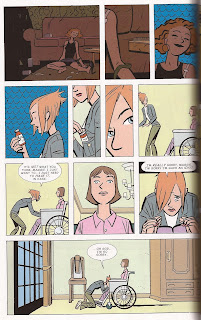A friend pressed a copy of Joyland into my hands, and wondered if it mightn't change my general opinion of Stephen King's work. In fact I found it fell very quickly into my usual experience of King. I enjoyed it, until I didn't. And then I stopped reading. No need to flesh that out, really.*
Still, King is kind of a fun guy to have on the scene, no? It amuses me to see the LARB furiously back-pedal after their early “usurp the King” broadside. FWIW, Colin Dickey's sympathies are very close to my own. He praises King the Reader, and I'm with him on that. For all King's bitching about New Yorker fiction, he's the guy who introduced me to Roberto Bolaño in the pages of Entertainment Weekly. I like him for that unexpected sort of provocation. Also, I unreservedly recommend his On Writing to anyone who reads English, not just for its good advice (“The adverb is not your friend”), but for King's self-disclosure: including before-and-after drafts of a short story is a gutsy, and reader-empowering, stunt that most writers are much too insecure to do.**
 Anyway, somewhere around the halfway mark, I dropped Joyland and picked up Zoo Station by David Downing, a book I've had for quite some time. It seems Jeff Bezos noticed my affection for Philip Kerr's Bernie Gunther novels, and he insisted I really ought to give Downing a look. I hesitated. If Downing wasn't as good as Kerr at this whole Berlin Noir scene, it would be tough slogging and a begrudged ten dollar purchase. If Downing was better, well, that could be problematic, too.
Anyway, somewhere around the halfway mark, I dropped Joyland and picked up Zoo Station by David Downing, a book I've had for quite some time. It seems Jeff Bezos noticed my affection for Philip Kerr's Bernie Gunther novels, and he insisted I really ought to give Downing a look. I hesitated. If Downing wasn't as good as Kerr at this whole Berlin Noir scene, it would be tough slogging and a begrudged ten dollar purchase. If Downing was better, well, that could be problematic, too.
“Noir” isn't Downing's game, however, though he is acutely aware of the many tragic shades of gray that ran through post-Weimar Germany. His publisher pitches the book as “Crime” and “Spy Thriller,” two classifications which fit, if somewhat on the Extra-Large side of things. Downing's protagonist, John Russell, is a British free-lance journalist treading the tides of midlife during the rise of the Nazis. He wants to stay close to the son he fathered in Germany, even as he notes with horror and depression the nation's lock-step toward war — and worse. Russell's trade is not exactly in demand — at least not from reputable sources — so he is living from hand-to-mouth. Then someone from a not-so-reputable source (in Russia) offers him a job that seems too good to be true. A survivor of the trenches as well as an earlier dalliance with Communism, Russell is slow to accept, but eventually he does. Without giving away any more, the set-up is a subtle and convincing gateway into the geopolitical machinations of the day. I loved it, and am cuing up the remaining books in the series.
On the non-literary side of things, I recently picked up season one of Friday Night Lights. I had my doubts about its worth, and the first episode was touch-and-go. So much of what I was seeing looked like something from another planet. Does small-town Texas really pray before and after each individual high school football game? Even in the Mennonite village of my childhood, that would have been pushing the religious thing a nudge too far.
But that candid approach to the material, and to the characters, won me over with surprising speed. Emboldened, I foisted the series on my family — even though the younger daughter (14) hates, hates, hates sports and will not abide any movie with a sporting event as its center-point. And I am here to tell you: Mikey likes it! In fact, nobody in this family can get enough of this football-centered soap opera.
That's just season one, mind you — there are four more to go (and I'm told S2 was a nearly-unrecoverable stinker). The only series I've seen justify a fourth season is The Wire. Five worthy seasons is doable; attempting it, however, remains unrecommended.
*Although I'll throw out one bitchy aside: it's jarring, to say the least, while reading a novel set in 1974 to encounter one character who says, “Is it live, or is it Memorex?” and another who offers to microwave a bowl of soup — within the first 35 pages. Granted, King's copy-editor probably wasn't even a gleam in her daddy's eye in 1974. But in a family of writers who apparently read each other's work, and don't dint on the criticism, these lapses are … surprising.
**Joel remarked on the effect King's fiction has on the adolescent reader, which Lydia Kiesling rather touchingly describes, at length, here.








